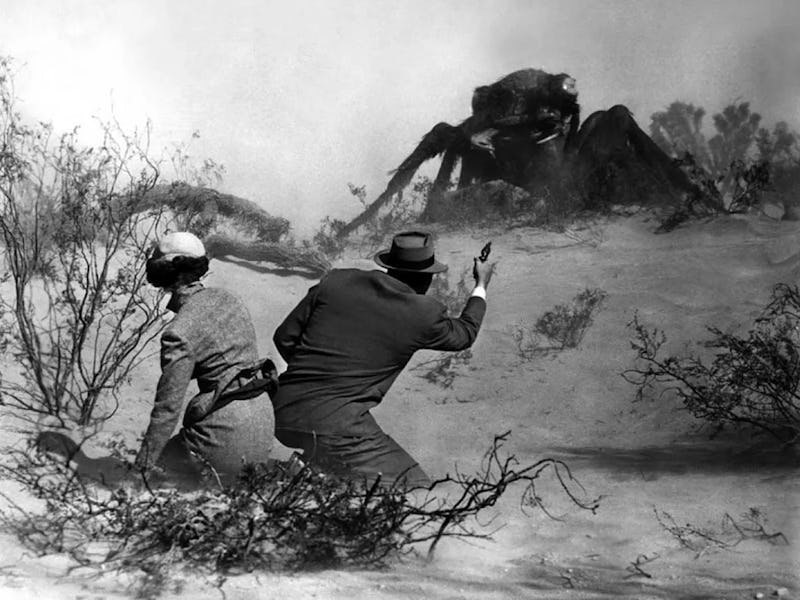Months Before Godzilla Changed Sci-Fi Forever, America Released Its Own Epic Monster Movie
Get the bug spray.

When it comes to the parade of giant cinematic monsters introduced in the 1950s, the one with the longest (and most profitable) legacy is Godzilla. Working as both sheer spectacle and horrific nuclear metaphor, the “King of the Monsters” went on to have a ludicrously successful film career. However, it wasn’t the first big creature to stomp across our screens, nor was it the first one to harness potent atomic allegory. Seventy years ago, and a few months before Godzilla’s Japanese premiere, Them! gave us an underrated genre classic, albeit with a very American point of view.
By 1954, Hollywood’s monster mash was in full swing. A 1952 re-release of the original King Kong had been a hit, and was swiftly followed in 1953 by The Beast from 20,000 Fathoms. In that film, the gigantic “Rhedosaurus” is awakened by a bomb test and eventually killed by radiation poisoning, turning atomic weaponry into both a nasty alarm clock and a devastating defensive countermeasure. Both films would inspire Godzilla, while America would double down on nuclear beasts in the form of super-sized ants with Them!
Directed by longtime journeyman Gordon Douglas for Warner Bros., Them! focuses on mysterious deaths and disappearances occurring in a small New Mexico town. The combined forces of the local police, the FBI, and assorted government folk discover the culprits are giant ants, mutated by the (real-life) atomic bomb experiments near Alamogordo. A race begins to exterminate the various nests in the Southwest and the armies of huge ants that have begun to spread across the world.
Though it might look schlocky to first-time viewers, Them! has solid, Academy Award-nominated special effects. None of it really matches the stop-motion mastery of King Kong or 20,000 Fathoms, but the puppeteering and model work reek of creepy energy and lack the cheap clumsiness that would often mark the genre. Also helpful is the film’s stunning soundwork. The ants emit a shrieking stridulation (in nature, it’s the sound that comes from certain insectoid body parts grinding together), which forms an overwhelming cacophony during action sequences while effectively harkening the arrival of the ants without them ever being seen. Imagine the theme from JAWS playing before the shark appears, only it’s shrill bug noises.
Them! would lose its Oscar bid to 20,000 Leagues Under The Sea, a Disney film that also had a sizable invertebrate in it. However, its attempt at filtering some thematic power through its science fiction revulsion isn’t as stable as its visuals. A staple of American monster films, especially those where the monster is created or fueled by atomic hubris, is that they tend to treat the creature as a big whoopsie. There’s little regret involved for the tests that produced the monsters or the effects they’ve had on humanity. Instead, they’re simply the byproduct of a justifiable advancement, and one more obstacle to be stopped by yet another leap in scientific ingenuity.
Or, in the case of Them!, a looot of flamethrowers.
Not a bug you can step on.
Godzilla, on the other hand, embodied a complex flurry of not just physical atomic damage but regret, guilt, and post-war trauma. It was simultaneously mankind’s creation and retribution, a status carried into modern efforts like Shin Godzilla and Godzilla Minus One. Them!, as adeptly made as it is, can’t compare here. Godzilla and Them! share a similar ending, though, with characters pondering the potential for more problems caused by the race for atomic destruction. While it absconds from pointing any fingers, Them! connecting a real-life atomic bomb test to its cinematic horrors is a little more contemplative than many of the irradiated beast adventures to come.
And they would come in swarms. Them! provided Warner Bros. with an irradiated ant-sized success, and was followed by the likes of Tarantula, The Deadly Mantis, Beginning of the End, and The Black Scorpion. None of these progressively genre-exhausting flicks would match up to Them!, and there would be an even wider gap between these efforts and Godzilla. At the very least, though, no audience members would ever look at an anthill the same way again.